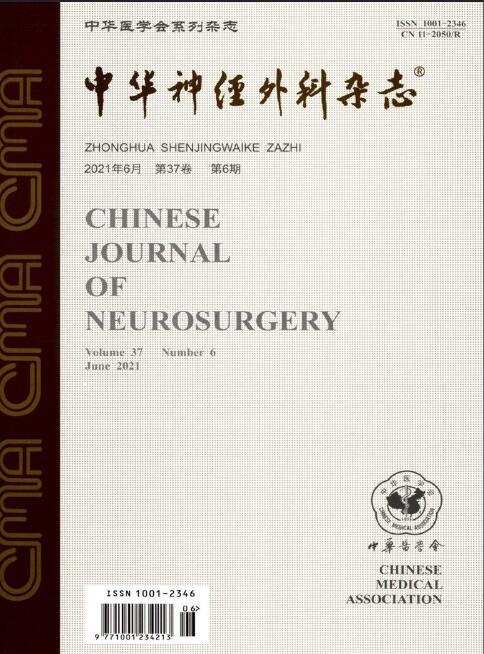颅咽管瘤患儿手术前后的认知和行为改变
Q4 Medicine
引用次数: 0
摘要
目的探讨颅咽管瘤患儿围手术期脑认知功能及行为的差异。方法回顾性分析2015年2月至2017年2月在清华大学玉泉医院神经外科行开颅手术的19例颅咽管瘤患者的临床资料。患者平均年龄9.10±3.53(6-15)岁。原发肿瘤12例,复发肿瘤7例。所有患者均行开颅手术切除肿瘤。经额冠切口入路14例,胼胝体-透明房室-穹窿入路3例,翼点小切口入路2例。手术前后采用韦氏智力测验量表进行智力测验。行为测试采用Conners儿童行为量表(适用于家长)。比较19例颅咽管瘤患儿手术前后2周的脑认知功能和行为变化。结果19例儿童颅咽管瘤全部切除17例,次全切除2例。无手术死亡。术前、术后总智商(智商)得分(101.68±18.50比103.05±15.67)、言语理解指标(98.00±13.51比101.00±17.07)、知觉推理指标(94.11±12.60比95.26±15.05)、工作记忆指标(87.00±14.15比92.16±19.12)、处理速度指标(92.95±17.17比95.47±16.91)差异无统计学意义(均P < 0.05)。患儿术前、术后2周行为评分差异无统计学意义(P < 0.05)。结论颅咽管瘤患儿术后智力和行为水平无明显下降。说明手术切除本身不会对患儿的认知功能造成损害。关键词:颅咽管瘤;孩子;认知;孩子的行为;外科手术本文章由计算机程序翻译,如有差异,请以英文原文为准。
Cognitive and behavioral changes in children with craniopharyngioma before and after surgery
Objective
To explore the differences of brain cognitive function and behavior in children with craniopharyngioma during perioperative period.
Methods
The clinical data of 19 patients with craniopharyngioma were retrospectively enrolled who underwent craniotomy at Department of Neurosurgery, Tsinghua University Yuquan Hospital from February 2015 to February 2017. The mean age of patients was 9.10±3.53 (6-15) years old. Twelve cases were primary tumors and 7 were recurrent tumors. Craniotomy was conducted for tumor resection in all patients. Fourteen cases were treated through frontal coronal incision approach, 3 through corpus callosum -transparent compartment-dome approach and 2 through small incision of pterional approach. The intelligence test was performed using the fourth edition of the Wechsler Intelligence Test Scale before and after surgery. The Conners Child Behavior Scale (for parents) was used for behavioral testing. The cognitive function and behavioral changes of the brain in 19 children with craniopharyngioma before and 2 weeks after operation were compared.
Results
Among the 19 children with craniopharyngiomas, total tumor resection was achieved in 17 cases and subtotal resection in 2. There was no operative death. The preoperative and postoperative total IQ (intelligence quotient) scores (101.68±18.50 vs. 103.05±15.67), verbal comprehension indexes(98.00±13.51 vs. 101.00±17.07), perceptual reasoning indexes (94.11±12.60 vs. 95.26±15.05), working memory indexes (87.00±14.15 vs. 92.16±19.12), processing speed indexes (92.95±17.17 vs. 95.47±16.91) had no significant difference (all P>0.05). There were no significant differences in behavior scores of the children before and 2 weeks after operation (all P>0.05).
Conclusion
There seems to be no significant decrease in postoperative intelligence and behavioral level in children with craniopharyngioma. It shows that the surgical resection itself would not cause damage to the cognitive function of the child.
Key words:
Craniopharyngioma; Child; Cognition; Child behavior; Neurosurgical procedures
求助全文
通过发布文献求助,成功后即可免费获取论文全文。
去求助
来源期刊

中华神经外科杂志
Medicine-Surgery
CiteScore
0.10
自引率
0.00%
发文量
10706
期刊介绍:
Chinese Journal of Neurosurgery is one of the series of journals organized by the Chinese Medical Association under the supervision of the China Association for Science and Technology. The journal is aimed at neurosurgeons and related researchers, and reports on the leading scientific research results and clinical experience in the field of neurosurgery, as well as the basic theoretical research closely related to neurosurgery.Chinese Journal of Neurosurgery has been included in many famous domestic search organizations, such as China Knowledge Resources Database, China Biomedical Journal Citation Database, Chinese Biomedical Journal Literature Database, China Science Citation Database, China Biomedical Literature Database, China Science and Technology Paper Citation Statistical Analysis Database, and China Science and Technology Journal Full Text Database, Wanfang Data Database of Medical Journals, etc.
 求助内容:
求助内容: 应助结果提醒方式:
应助结果提醒方式:


